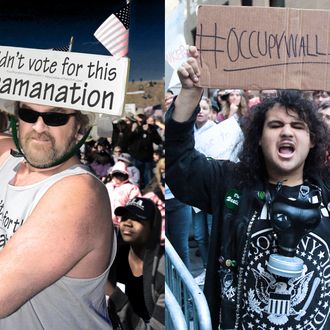
Last month, Occupy Wall Street seemed to have struck a nerve with voters; this month, it seems to have gotten on voters’ nerves: A just-released Public Policy Polling survey found that support for the movement has slipped from 35 percent approval (with an almost evenly matched disapproval rating) to 33 percent approval, 45 percent disapproval. And that’s not even the most dire poll for Occupy Wall Street —a Marist poll has OWS at 60 percent disapproval, and just 29 percent in favor.
That means the undecideds are turning against the demonstrators, and it seems as if the tea party just might be reaping the benefits, as Slate’s Dave Weigel points out. Support for the tea party rose by about 3 percent over the same time period, at least in the PPP poll. (Marist has tea party disapproval at 66 percent, higher than Occupy Wall Street.) Slate’s Weigel has a theory about why OWS has dipped so much:
PPP doesn’t go into the reasons for the drop in Occupy support and rise in conservative support, but I think we all remember the 1960s, don’t we? This is a classic reaction to scenes of Occupiers clashing with cities and police who want to clear them out. It’s a reflection of a steady thrum-thrum of viral Internet articles and local news reports about the dark side of Occupation – Kalle Lasn’s crazy anti-Jewish rant from 2002, the popular Fox News stories about ACORN running the movement, reports of sexual assault, etc.
The PPP poll was conducted before this week’s New York City evacuation, and so perhaps those, like Ezra Klein, who’ve theorized that the Bloomberg action against Zuccotti’s occupiers was just the sympathy bump they need will be proved right. Or maybe it’s just that Klein et al. are projecting their own sympathies onto the public, when, in fact, the average neutral observer is inclined to swing the other way when confronted with the optics of a cop-protester standoff.





























